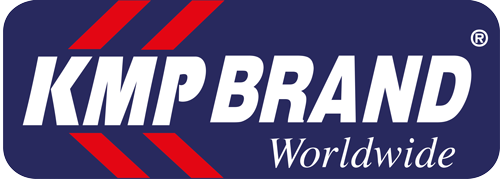KMP Replacement
ENGINE BEARINGS
KMP® engine bearings
The KMP engine bearing range is produced with quality at the forefront, with consideration of materials and manufacturing processes to ensure your engine’s longevity. The bearing range consists of engine main bearings, thrust bearings, conrod bearings, camshaft and small end bearings.
KMP Brand® bearings are suitable for a wide range of engines including: Case IH ®, Caterpillar®, Cummins®, Detroit Diesel®, Fiat®, Ford New Holland®, Iveco®, JCB®, John Deere®, Komatsu®, Massey Ferguson®, NEF® and Perkins®.
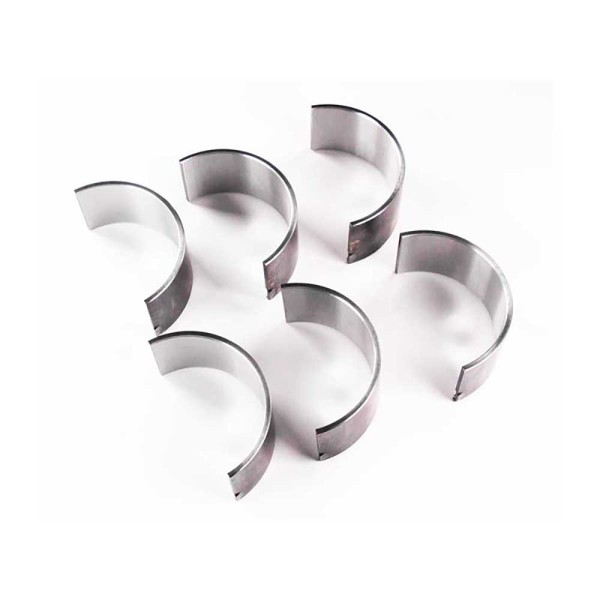
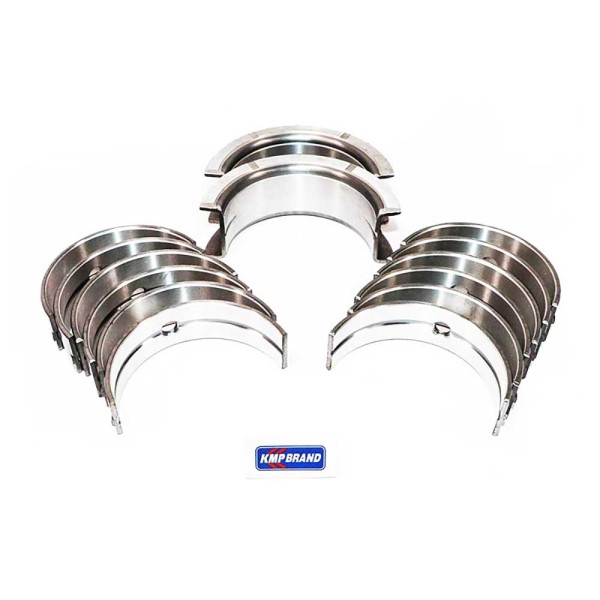
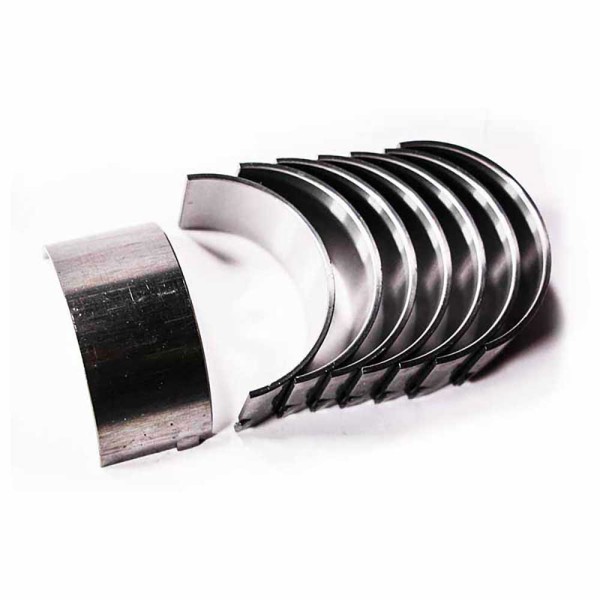
In a typical engine, there are two main types of bearings: main bearings and connecting rod bearings.
What are Main bearings in an engine?
Main Engine bearings are components designed to support the crankshaft within the engine, preventing direct metal-to-metal contact by creating an oil layer between the two surfaces. This separation is crucial to reduce friction and heat, ensuring the efficiency of the engine.
What are Conrod bearings in an engine?
Connecting rod bearings support the connecting rods that link the pistons to the crankshaft.
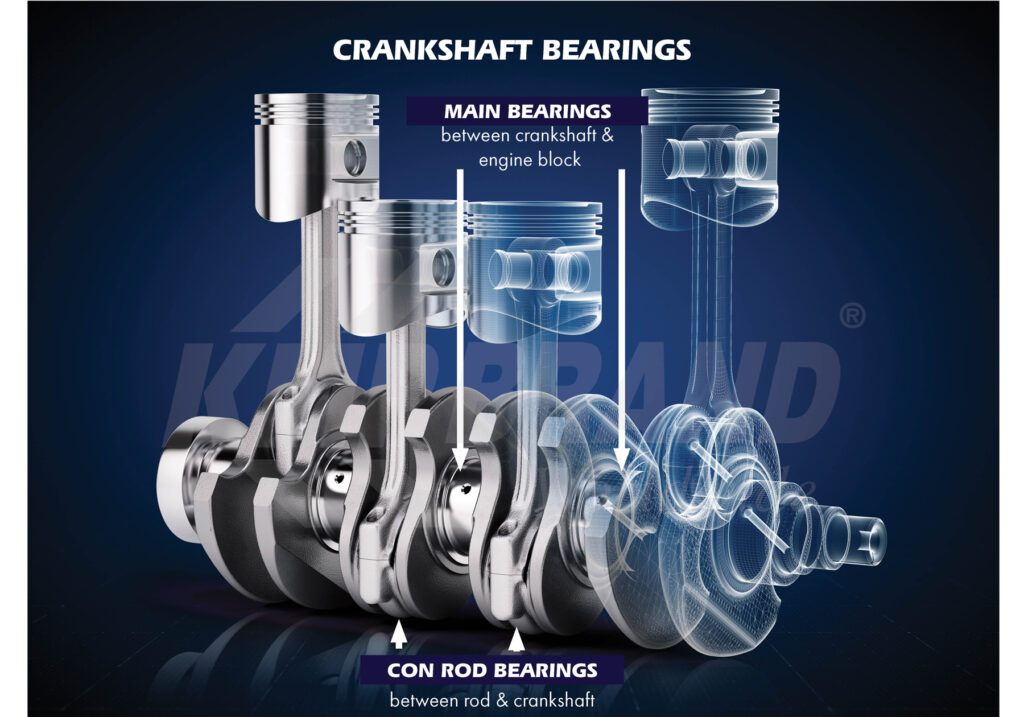
How many miles do engine bearings last?
Engine bearings are subjected to wear and tear due to the forces and heat generated during operation.
The service life of an engine bearing can vary depending on several factors, including the type of bearing, the engine’s design, operating conditions, maintenance practices, and the quality of the components.
Connecting Rod Bearings:
The service life of connecting rod bearings can be influenced by engine RPM, load conditions, lubrication quality, and maintenance.
Aggressive driving, high-performance modifications, or poor maintenance practices can reduce the lifespan of connecting rod bearings.
Main Bearings:
Main bearings typically have a longer service life compared to connecting rod bearings.
Tracking Mileage:
While mileage can provide a general guideline for when to inspect or replace engine bearings, it’s important to consider other factors. Some engines may require bearing replacement sooner due to factors like poor lubrication, contaminated oil, or manufacturing defects.
Maintenance and Inspection:
- Regular oil changes with high-quality oil and proper oil filter replacement are crucial for extending bearing life. Monitoring oil pressure and addressing any sudden drops can help detect potential issues with bearings.
- Visual inspections during routine maintenance or when engine noise is detected can reveal signs of wear.
Ultimately, if you’re concerned about the condition of your engine bearings, it’s recommended to consult your vehicle’s maintenance manual for specific guidelines and to seek the advice of a qualified mechanic. Regular maintenance and attentive driving habits contribute significantly to the longevity of engine bearings.
What are the symptoms of a worn engine bearing?
Identifying the symptoms of worn engine bearings is essential for timely intervention and prevention of extensive damage. Common signs of worn engine bearings include:
- Knocking or Rumbling Sounds: One of the primary indicators of a failing engine bearing is a knocking or rumbling noise coming from the engine. This noise is often more pronounced during acceleration.
- Low Oil Pressure: Engine bearings rely on a constant supply of oil for lubrication. A drop in oil pressure can cause bearing wear, leading to insufficient lubrication and increased friction.
- Excessive Vibration: Worn bearings can cause increased vibration throughout the engine.
- Increased Operating Temperature: An increased operating temperature may indicate that the layer of oil between bearing and main journal has broken down causing metal to metal contact. This friction will generate excessive heat in the engine.
- Oil Contamination: An increased operating A good tell-tale sign bearings are wearing out is the condition of the engine oil. This can be monitored through oil sampling and regular oil changes as per the engine workshop manual.
Can you drive with worn engine bearings?
Continuing to drive with worn engine bearings is highly discouraged. Worn bearings compromise the integrity of the engine’s lubrication system, causing increased friction and heat. This can eventually result in a complete engine failure, potentially requiring expensive repairs. If you suspect worn engine bearings, it is crucial to address the issue promptly to avoid further damage.
What causes engine bearing failure?
Several factors contribute to engine bearing failure, including:
- Poor Lubrication: Inadequate oil supply or contaminated oil can lead to insufficient lubrication, causing accelerated wear on the bearings.
- Overheating: Excessive heat generated within the engine can lead to thermal expansion, affecting the clearances in the bearings and accelerating wear.
- Contaminants: Dirt, debris, or metal particles in the oil can cause abrasion on the bearing surfaces, or oil channel blockages, leading to premature failure.
- High Mileage: As engines accumulate mileage, the wear on bearings becomes inevitable. Regular maintenance and timely replacement can mitigate this issue.
Enhance engine performance with KMP's replacement engine bearings
KMP’s replacement engine bearings offer a reliable solution for those experiencing issues with worn engine bearings. Recognising the symptoms of bearing wear, understanding their function in the engine, and addressing the causes of failure are essential steps in maintaining a healthy and efficient engine.
